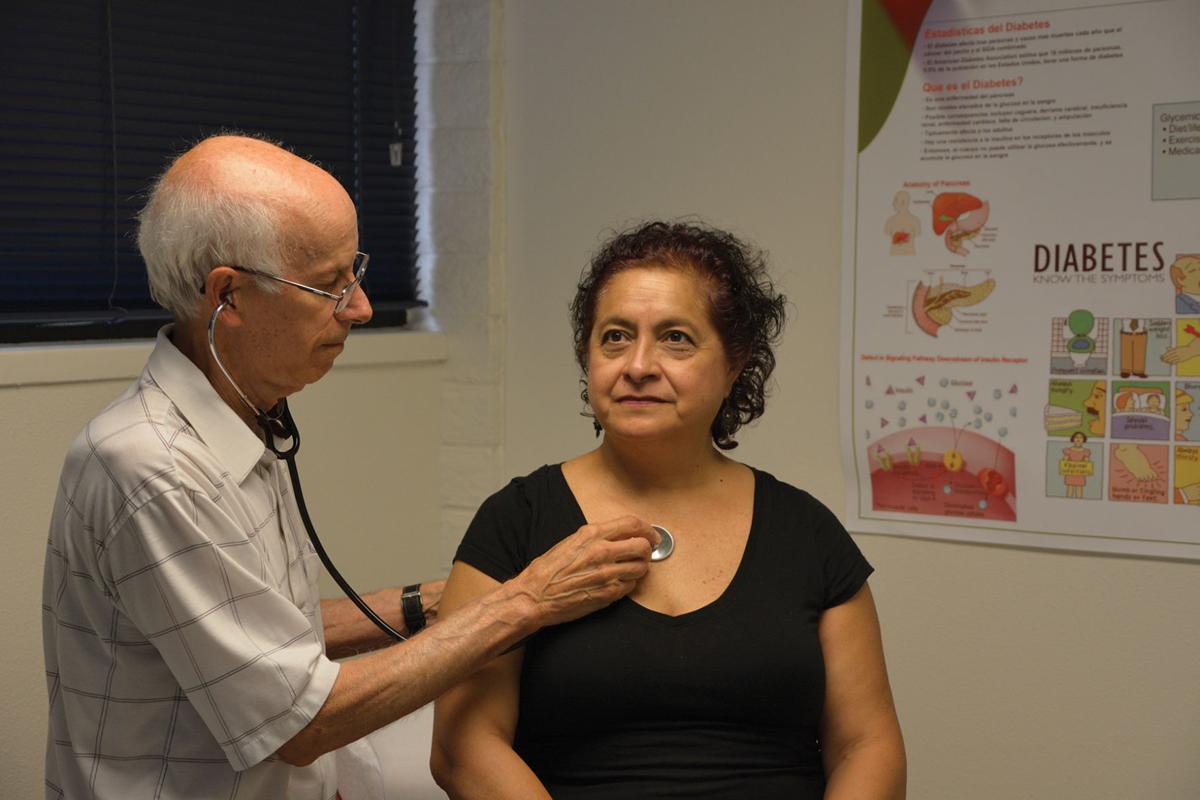Throughout the ongoing saga of national health-care reform, a force of more than 100 volunteers in a small clinic on Tucson’s south side has been working to ensure that no one is left untreated.
“At Clinica Amistad, we see people with no health-care insurance who don’t have many options. For one reason or another they are unable to get insurance: They can’t afford it or they do not qualify or if they have insurance, they can’t afford out-of-pocket co-pays. We provide care and medications at no charge to them . ... We are a safety net for people who might otherwise be limited in the care that they are able to access,” said Raymond Graap, M.D., medical director of Clinica Amistad.
Clinica Amistad, located at the El Pueblo Neighborhood Center at 101 W. Irvington Road, Building 3, has been providing no-cost primary and preventative health care, education and medications since 2003.
Open from 5 to 9 p.m. every Wednesday and Thursday and from 10 a.m. to 2 p.m. the first Saturday of each month, the nonprofit clinic served more than 1,700 patients in 2016; it is on track for more than 2,000 this year. Nearly 60 percent of those served have an annual household income of $20,800 or less and the majority are Spanish-speaking.
“Basically we serve the health-care needs of the underserved in the greater Tucson area. We are a primary health-care clinic and if we are not able to treat patients, we refer them out to specialized practitioners with whom we have arrangements to offer services at reduced rates. Additionally, we often assist patients in paying for health-care needs outside of the clinic,” said Larry Jagnow, a member of the board of directors.
Clinic patients have access to necessary screenings, laboratory tests and imaging services, and a comprehensive array of specialists in more than 15 fields including cardiology, dermatology, endocrinology, pulmonology and more.
Graap said the clinic philosophy is based on an integrative model of care that combines traditional medicine and education aimed at prevention with alternative therapies and treatments for common chronic conditions. Therapies such as body work and energy therapy (Bowenwork and Zero Balancing), acupuncture, and nutritional counseling are intended to promote optimal health and wellness. Clinica Amistad also offers information about social services, personal counseling and other services.
Graap said the integrative model can be helpful in improving quality of life in a patient population battling chronic conditions such as diabetes, high blood pressure and heart disease. About 38 percent of Clinica Amistad patients have high blood pressure and 44 percent are obese; while 38 percent are diabetic (compared to a national average of 9.3 percent).
Clinica Amistad also helps patients to access medications such as insulin that have grown increasingly expensive, according to Graap. He said that long-lasting insulins like Lantus and Levemir can cost up to $367 per month and must be used in combination with short-acting insulins that may cost up to $425 monthly, making them cost-prohibitive for many.
“So many people require insulin and the rates that the pharmaceutical companies charge are outrageous. We don’t use designer insulins; they are way too expensive for our patients. The co-pays are so high even for people who have insurance that they have trouble getting their medications. We have found an outlet that provides standard older insulin that is excellent at $25 per month,” he said.
Graap said that the services provided by Clinica Amistad are cost-effective not only for patients, but for the entire community since the clinic care can help to preclude high-cost visits to emergency rooms.
He credits generous local health-care providers—physicians, nurses, licensed nurse practitioners, physician assistants, pharmacists, body work specialists and others—along with students from the University of Arizona and other community volunteers for making the services possible by donating their time and expertise.
“Health-care providers are very receptive to helping; they spend their days seeing patients and many come in to our clinic operation after that. Kudos to them for pitching in to help even after a full day,” said Graap, 81, an internal medicine physician and endocrinologist who began working at the clinic after retiring from his practice in 2010.
Aside from volunteers, clinic operations are made possible by grants from philanthropic foundations and contributions from local businesses, churches and private individuals. Supporters have included the Women’s Foundation of Southern Arizona and Southwest Gas.
Overall, Graap views the clinic as a positive example of collaboration and thinks that it is imperative for the country to come to an agreement that will provide cost-effective health care on a national level.
“As a country, we are way behind the eight ball in providing care for everyone in the nation. Every other advanced Western nation has universal care of one type or another so that people aren’t left out. If it weren’t for the financial interests of insurance companies and big pharmaceuticals, we would have had Medicare for everyone a long time ago. Medicare is not perfect—any health plan is a matter of continual improvement—but it is a sound base for providing medical care that is a huge help to an awful lot of people,” he said.





